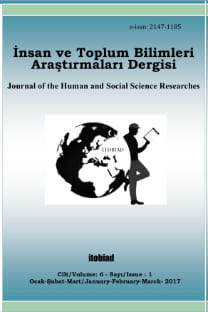Türkiye’de Hisse Senedi Piyasasının Enflasyon Açıklamalarındaki Sürprizlere Tepkisi
Olay çalışması, makroekonomik duyurular, beklenmeyen enflasyon, hisse senedi piyasası, anormal getiriler
___
- Basdas, U., & Oran, A. (2014). Event studies in Turkey. Borsa Istanbul Review, 14(3), 167–188.
- Boyd, J. H., Hu, J., & Jagannathan, R. (2005). The stock market’s reaction to unemployment news: Why bad news is usually good for stocks. The Journal of Finance, 60(2), 649–672.
- Chen, N.-F., Roll, R., & Ross, S. A. (1986). Economic forces and the stock market. Journal of business, 383–403.
- Cutler, D. M., Poterba, J. M., & Summers, L. H. (1989). What moves stock prices? The Journal of Portfolio Management, 15(3), 4–12.
- Díaz, A., & Jareño, F. (2013). Inflation news and stock returns: market direction and flow-through ability. Empirical Economics, 44(2), 775– 798.
- Engle, R. F. (1998). Macroeconomic announcements and volatility of treasury futures. Department of Economics, UCSD. http://eprints.cdlib.org/uc/item/7rd4g3bk.pdf
- Fama, E. F. (1970). Efficient Capital Markets: A Review of Theory and Empirical Work. Journal of Finance, 25(2), 383–417.
- Flannery, M. J., & Protopapadakis, A. A. (2002). Macroeconomic factors do influence aggregate stock returns. Review of Financial Studies, 15(3), 751–782.
- Gurgul, H., Suliga, M., & Wójtowicz, T. (2012). Responses of the Warsaw Stock Exchange to the US Macroeconomic Data Announcements. Managerial Economics, 12, 41–60.
- Hu, Z., & Li, L. (1998). Responses of the Stock Market to Macroeconomic Announcements across Economic States. IMF Working Paper, WP/98/79: International Monetary Fund.
- Kim, S.-J., McKenzie, M. D., & Faff, R. W. (2004). Macroeconomic news announcements and the role of expectations: evidence for US bond, stock and foreign exchange markets. Journal of Multinational Financial Management, 14(3), 217–232.
- McQueen, G., & Roley, V. V. (1993). Stock prices, news, and business conditions. Review of financial studies, 6(3), 683–707.
- Medovikov, I. (2016). When does the stock market listen to economic news? New evidence from copulas and news wires. Journal of Banking & Finance. http://doi.org/http://dx.doi.org/10.1016/j.jbankfin.2016.01.004
- Ross, S. A., Westerfield, R., & Jaffe, J. F. (2008). Corporate finance. Boston: McGraw-Hill/Irwin.
- Veronesi, P. (1999). Stock market overreactions to bad news in good times: a rational expectations equilibrium model. Review of Financial Studies, 12(5), 975–1007.
- Vrugt, E. B. (2009). US and Japanese macroeconomic news and stock market volatility in Asia-Pacific. Pacific-Basin Finance Journal, 17(5), 611–627.
- Zhang, X. (2006). Information uncertainty and stock returns. The Journal of Finance, 61(1), 105–137.
- ISSN: 2147-1185
- Yayın Aralığı: Yılda 4 Sayı
- Başlangıç: 2012
- Yayıncı: Mustafa SÜLEYMAN ÖZCAN
The State of The Turkish Textile and Ready-Wear Industries
Borsa İstanbul (BIST) ve BRICS Ülkelerinin Hisse Senedi Piyasalarının İlişkisi Üzerine Bir İnceleme
Türkiye'de Hisse Senedi Piyasasının Enflasyon Açıklamalarındaki Sürprizlere Tepkisi
Konsolide Bütçe Açıkları ve İç Borç-Dış Borç İlişkisi: Türkiye Örneği
YILDIZ SAĞLAM ÇELİKÖZ, İbrahim YUKACI
Türkiye’nin Dış Ticaret Dengesinde J-Eğrisi Etkisi
İşletme Yönetiminde Sürdürülebilir İnsan Kaynakları Yönetiminin Yeri ve Önemi
Türkiye’de Hisse Senedi Piyasasının Enflasyon Açıklamalarındaki Sürprizlere Tepkisi
Aile İşletmelerinde Aile Değerlerinin Örgüt Kültürüne Etkisi
METİN REYHANOĞLU, ŞÜKRAN SIRKINTIOĞLU YILDIRIM
Dışa Açıklık ile Finansal Gelişme Arasındaki İlişki: G 20 Ülkeleri Örneği
Türkiye'de Hisse Senedi Piyasasının Enflasyon Açıklamalarındaki Sürprizlere Tepkisi
